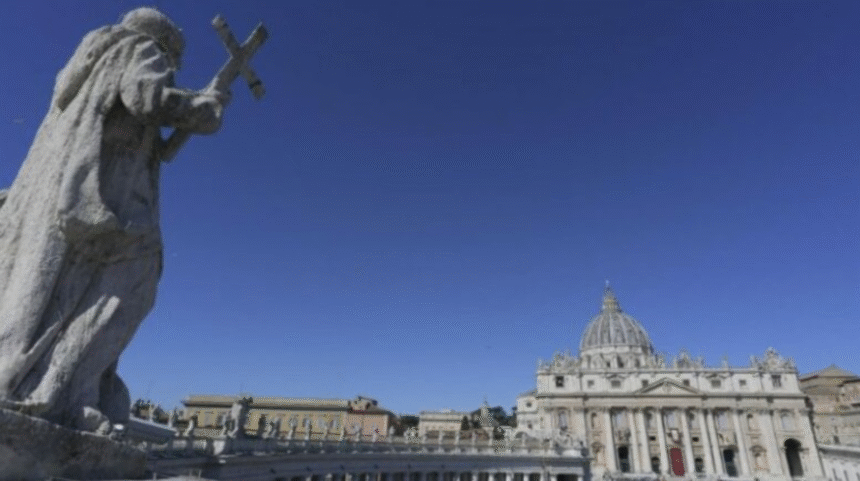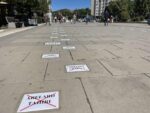The appointment of Luigi Bianco as Apostolic Nuncio to Slovenia and Apostolic Delegate for Kosovo has been welcomed with joy by the Diocese of Prizren-Prishtina, according to the Catholic Church in Kosovo.
This appointment was made by Pope Leo XIV on May 20, just 12 days after he assumed the papacy following the death of Pope Francis on April 25 this year.
Don Shan Zefi, vicar of the Diocese of Kosovo, said the prompt appointment of a new apostolic delegate for Kosovo by the new Pope is a positive sign for the country.
“…because even this Pope, right at the beginning of his pontificate, has immediately addressed the issue of Kosovo. That’s why he appointed this delegate for Kosovo, whose seat is in Ljubljana,” Don Shan Zefi told Radio Free Europe.
However, Luigi Bianco’s role in Slovenia and Kosovo will not be identical.
An Apostolic Nuncio is the Vatican’s highest diplomatic representative in a given country — equivalent to an ambassador — and also represents the Pope to the local Catholic Church.
Meanwhile, according to previous Vatican explanations, the mission of an Apostolic Delegate “is not of a diplomatic nature but responds to the need to adequately meet the pastoral needs of the local Catholic faithful.”
The Vatican appointed an Apostolic Delegate for Kosovo for the first time in February 2011, during the pontificate of Pope Benedict XVI.
The reason why the Vatican appoints only a delegate — and not a nuncio — for Kosovo is that the Holy See has not formally recognized Kosovo as an independent state.
Kosovo declared independence on February 17, 2008, and according to its Ministry of Foreign Affairs and Diaspora, it has been recognized by 119 countries.
Radio Free Europe reached out to the Holy See for an official position on the possible recognition of Kosovo’s independence and the main obstacles to this process but had not received a response by the time of publication.
The Complex Non-Recognition of Kosovo by the Vatican
The Vatican’s lack of recognition of Kosovo is seen as a complex issue by Kosovar diplomats, former officials, and the Catholic Church in Kosovo.
Vehbi Miftari, Head of Kosovo’s Special Mission to the Holy See, says that relations between Kosovo and the Vatican have entered a new and dynamic phase.
He points to stronger political relations, the establishment of a Permanent Mission of Kosovo to the Vatican in 2023, deeper cultural cooperation, and joint efforts to promote cultural values and human rights as signs that the Holy See recognizes Kosovo’s democratic reality.
However, Miftari also notes key challenges that stand in the way of formal recognition:
“Beyond political relations, ecumenical dialogue, the EU integration process, and the Kosovo-Serbia political dialogue are equally important to the Holy See,” he told Radio Free Europe.
Don Shan Zefi stresses that the Holy See is carefully observing the ongoing normalization talks between Kosovo and Serbia, which began in 2011 under EU mediation but have yet to conclude.
“The sooner this process is completed, the sooner the Holy See will recognize Kosovo. This is my personal opinion,” he said, noting that the Vatican may be waiting to see a final peace agreement between the two countries.
He also sees ecumenism — dialogue between Christian churches (Catholic, Orthodox, and Protestant) — as a key factor in the Vatican’s hesitancy.
The Catholic and Orthodox churches split around 1,000 years ago, while Protestantism split from Catholicism in the 16th century. Ecumenical dialogue intensified in the second half of the 20th century and continues today.
Both the Russian and Serbian Orthodox Churches oppose Kosovo’s independence. In this context, Don Shan Zefi believes the Vatican considers global Christian unity and may have its reservations about recognizing Kosovo.
“There are certainly objections from the Orthodox world against recognizing Kosovo. Diplomatically, it seems they are waiting for Serbia to recognize Kosovo first, and then the Vatican may follow,” he said.
Publicist Engjëll Koliqi, who lived in Italy for two decades and was a journalist for Vatican Radio, agrees. He believes the Vatican is deliberately avoiding formal recognition to prevent harming ecumenical efforts.
“Such recognition would infuriate the Serbian and Russian Orthodox, and the whole ecumenical dialogue could collapse,” he told Radio Free Europe in writing.
Albert Prenkaj, Kosovo’s former ambassador to Italy and former political director in the Ministry of Foreign Affairs, confirms that ecumenism has been mentioned in early Vatican-Kosovo communications. He recalls being told that the Vatican recognizes only UN member states — and Kosovo is not yet one.
Moreover, the Serbian Orthodox Church, along with Serbia itself, considers Kosovo a part of Serbia and maintains strong support from Russia.
Nonetheless, Prenkaj says Kosovo has continually presented its case to the Vatican based on three key arguments:
- Political reality: Kosovo is a new, independent state that contributes to regional peace and security;
- Right to self-determination: Kosovo declared independence in line with international law;
- Precedent: Other countries that recognized Kosovo did so based on the first two arguments.
How Do Kosovo’s Institutions View Relations with the Vatican?
“The Republic of Kosovo and the Holy See have very good relations, which have continually deepened,” Kosovo’s Presidential Office told Radio Free Europe in writing.
They credit the efforts of President Vjosa Osmani, the late Pope Francis, and the Vatican’s Secretariat of State for enhancing these ties.
As a result, in January 2023, Kosovo and the Vatican agreed to elevate their relationship, and Osmani formally decreed the establishment of Kosovo’s Special Mission to the Holy See.
Miftari, who leads this mission, says Kosovo has maintained a constant presence in the Vatican, building trust and extending cooperation not only politically but also culturally and socially.
Are There Signs of Possible Recognition?
The Presidential Office says President Osmani remains committed to further deepening relations — with the aim of achieving full recognition and diplomatic relations.
They did not confirm whether there are concrete signals of imminent recognition.
However, the Special Mission in the Vatican believes the ongoing strengthening of ties supports this goal.
“The deepening of political relations and cultural cooperation, Kosovo’s permanent presence in the Vatican, the Vatican’s attentiveness to Kosovo’s political and demographic reality, and the institutions’ commitment to treating the Vatican as a foreign policy priority all support this goal,” said Miftari.
When Did Communication Begin?
Kosovo’s political leaders first established contact with the Vatican in the early 1990s.
In 1993, Ibrahim Rugova — then leader of the Democratic League of Kosovo and later the first President of Kosovo — met Pope John Paul II. This was the first time the Holy See received a Kosovar political leader in a private audience.
Rugova, a symbol of Kosovo’s peaceful resistance in the 1990s, continued to meet the Pope during and after the 1999 war.
Pope John Paul II died in April 2005. Rugova died in January 2006.
In February 2008, just two weeks before Kosovo declared independence, then-President Fatmir Sejdiu met Pope Benedict XVI in a private audience.
According to Albert Prenkaj, on the day Kosovo declared independence, the Vatican spokesman at the time, Federico Lombardi, issued a statement encouraging political leaders in Kosovo and Serbia to act with restraint and maturity — a message understood by Kosovo as implicit recognition.
Don Shan Zefi, however, considers the era of Rugova and Pope John Paul II as the high point of Vatican-Kosovo relations.
“There was great sympathy for us. With Pope John Paul II, we felt that the door was always open. That strength has faded a bit since then,” he said.
He emphasized that the Diocese of Kosovo continues to call on the Vatican to formally recognize Kosovo, though achieving this goal will require the joint effort of all Kosovar institutions.
Before the 1999 war, the Catholic Church in Kosovo was under the Diocese of Skopje-Prizren. In 2000, it became the Apostolic Administration of Prizren, and since May 2019, it has been elevated to the status of a full Diocese of Prizren.







